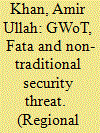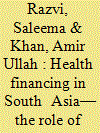| Srl | Item |
| 1 |
ID:
135570


|
|
|
|
|
| Summary/Abstract |
The theoretical framework exploring security changed following the end of the cold war. In the post-cold war era, strategic thinkers and policy makers developed a new discourse that took into account non-military security issue like lack of healthcare, poverty, illiteracy, unemployment, poor food, poor sanitation system, poor governance and environmental issues as non-traditional security issue. This innovative paradigm shift has helped expand the horizon of security studies. The contribution of Copenhagen school is noteworthy in this connection.
|
|
|
|
|
|
|
|
|
|
|
|
|
|
|
|
| 2 |
ID:
155174


|
|
|
|
|
| Summary/Abstract |
Millions of households are pushed into poverty every year because of high outof-pocket
(OOP) expenditure on health care. Globally, each year more than 150
million people face financial catastrophe and around 100 million suffer destitution
due to OOP payments made for health care. More than 90 per cent of these people
reside in low-income countries. In South Asia, impoverishment due to health
payments is significant with at least 32 million people in India alone being pushed
into poverty annually due to OOP expenditures on health care. In most health care
systems in this region, the role of public spending on health and prepaid schemes,
such as tax and social insurance, is limited as is the extent of financial risk protection.
The problem is compounded by the large informal sector which is a major
challenge to attaining universal health coverage in South Asian countries.
Recent literature points to the role of public–private partnerships (PPP) in
health care as a viable solution for ensuring equitable access to health care especially
for the poor. This article seeks to review the major components of health
care financing and reform including financial risk protection, resource generation
and pooling, and PPPs in procurement and payment in South Asia. It identifies
key lessons across the health financing systems of Asian countries that
have attempted to reduce dependence on OOP expenditures, expanded health
service delivery and increased pooled health financing mechanisms. It analyses
the role and importance of PPPs in mitigating the impoverishing effects of OOP
health expenditure in South Asia.
|
|
|
|
|
|
|
|
|
|
|
|
|
|
|
|